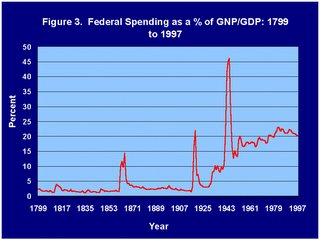The Tyranny of the Status Quo
One reason is that many people have learned to adapt to the system, with all of its flaws. People who have managed to do all right in the current system will fight to keep things as they are.
But even people who don’t have any interest in the status quo are reluctant to change things. People are always suspicious of change. They fear it even though most change in the last century has probably been for the good. People are comfortable with things as they are and risk-averse about the prospect of a new society.
These thoughts occurred to me as I was reading some comments the Indian Economy blog and elsewhere justifying a mixed economy for India. It would seem to me that nothing was so obvious as the incompetence of the Indian government, and people would be happy to see it get out of as many areas as possible. This should be especially apparent since the only prosperity India has seen in the last thousand years has come as a direct result of some modest market liberalization. But people fear change. So right now, India has made less progress in transitioning to a market economy than several Eastern European nations.
I am reminded of this when thinking of the U.S. medical system. It is really a strange mixture of market forces, regulation, and de facto socialism. It covers some people and not others. It is extremely expensive but it does provide good care to those lucky enough to have it. No one would have designed such an odd system, but no one seems too intent on really changing it either. The only reason anyone would support the current system is that it is the current system.
Bureaucracies are essential unchangeable since all of the people who work for a bureaucracy owe their jobs to the status quo. Anyone who was really bothered by the status quo probably became frustrated and left. People with a lot of energy and bright ideas about how to make things better soon figure out that bureaucracy is not the place to be – the market is the place.
We should understand that one of the costs of creating a system is that it will be hard to impossible to ever destroy it if we later discover this system has outlived its usefulness. I read somewhere that the U.S. still had a strategic helium reserve for our blimps until a few years ago, (maybe we still have it).
The free market’s greatest virtue is that it has no tyranny of the status quo. It reinvents itself daily to provide the goods that people want today, not years ago. Old established firms that have been around for ages still have to prove themselves against new ones that have just come into the market a year ago.
But this constant requirement to “prove yourself” applies to people as well as firms. Maybe that is why people aren’t so enthusiastic about the market. They hate to think that they might be poor when their old because their skills have become obsolete. Or maybe they just wish that life would give them the goodies without having to earn them in some way. Whatever the reason, we should back ourselves a little more. I know that when I’m 60, I’ll easily beat any 25-year-old at my game. Luckily for me, I don’t play cricket.






